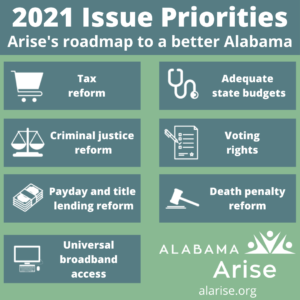Grassroots democracy will be on display when Alabama Arise members choose our 2020 issue priorities at our annual meeting Sept. 7 in Montgomery.
The following proposals will be up for a vote for our 2020 legislative agenda.
Below, you’ll find member groups’ summaries of their new and modified proposals. And you’ll find our policy staff’s overviews of the current issue priorities and our two permanent priorities: tax reform and adequate state budgets. We hope to see you in September as we gather to renew our shared commitment to building a better Alabama for all!
New issue proposal
Housing Trust Fund revenue
Submitted by Gordon Sullivan, Low Income Housing Coalition of Alabama (LIHCA)
 LIHCA thanks Alabama Arise and its members for supporting the Housing Trust Fund in 2018 and previous years. Our combined efforts resulted in social and political momentum to secure dedicated revenue for the Alabama Housing Trust Fund (AHTF)! We are here to ask for your continued support of the AHTF and help in securing dedicated revenue for the fund in 2020.
LIHCA thanks Alabama Arise and its members for supporting the Housing Trust Fund in 2018 and previous years. Our combined efforts resulted in social and political momentum to secure dedicated revenue for the Alabama Housing Trust Fund (AHTF)! We are here to ask for your continued support of the AHTF and help in securing dedicated revenue for the fund in 2020.
We believe safe, decent and affordable housing is a basic human right. Hard-working Alabamians should be able to pay rent and still be able to put food on the table. Unfortunately for many Alabamians, finding a safe and affordable home is only a dream. Alabama is in a housing crisis, with a lack of nearly 70,000 rental homes for folks surviving on minimum wage and fixed incomes.
Folks making minimum wage have to work 82 hours a week to afford a market-rate two-bedroom apartment. By doing so, they miss out on family suppers and Little League, because there simply aren’t enough hours in the day. Every child deserves a safe place to call home and a chance to have those who love them help with homework and read bedtime stories.
The AHTF created a fund to construct, rehabilitate and maintain homes for low-income households. Though the AHTF was created in 2012, it was enabling legislation and did not come with funding. That means we can’t create any new or rehabilitate any existing homes or address housing problems related to natural disasters. That is why LIHCA will seek dedicated revenue for the AHTF in 2020.
Proposed legislation to fund the AHTF
The bill, sponsored by Rep. Neil Rafferty, D-Birmingham, would increase the mortgage record tax from 15 cents to 20 cents for every $100 of a mortgage. This would put approximately $15 million per year in the AHTF. This type of revenue is a common funding source for housing trust funds across the country. In Alabama, this tax has not been increased since it was enacted in 1935.
We know that two-thirds of Alabamians (67%) see the lack of affordability as a problem in our state and that a strong majority (63%) of Alabamians are ready for state action to increase housing opportunities for households priced out of the market. Building on the momentum of previous years, we believe attaining bipartisan co-sponsors and endorsements from influential groups throughout the state is possible in 2020.
With the creation of new affordable homes in Alabama, families will begin to achieve economic stability. Communities will reduce blight. And the state will see an economic impact of nearly $1 billion over 10 years.
The dedicated revenue bill supports Arise’s values and its membership’s vision for addressing poverty in Alabama by investing in communities and helping low-income households access safe and affordable homes. The dedicated revenue bill will provide $15 million per year to create and rehabilitate homes for those in need. We have been successful in building momentum with Arise’s support in past years. Let’s work together to finish what we started!
Modified issue proposal
Voting rights
Submitted by Scott Douglas and Tari Williams, Greater Birmingham Ministries, and Ned Freeman, Birmingham Friends Meeting (Quakers)
 Let’s build on Arise’s commitment to voting rights, continuing to prioritize automatic voter registration (AVR) and focusing on restoration of voting rights for Alabamians affected by felony disenfranchisement. Under AVR, Alabamians would be registered to vote by default, without having to register themselves, because the state already has the necessary information. And restoring voting rights for everyone would affirm basic ideals of democracy.
Let’s build on Arise’s commitment to voting rights, continuing to prioritize automatic voter registration (AVR) and focusing on restoration of voting rights for Alabamians affected by felony disenfranchisement. Under AVR, Alabamians would be registered to vote by default, without having to register themselves, because the state already has the necessary information. And restoring voting rights for everyone would affirm basic ideals of democracy.
Historically, Alabama has been a leader among states with the most severely punitive disenfranchisement laws. These laws, with their blatantly racist history, have kept African Americans from the polls in enormous – and enormously disproportionate – numbers. Of the more than 280,000 disenfranchised felons in Alabama, nearly 150,000 are black, according to the Sentencing Project. That means that disenfranchised felons make up more than 15% of the state’s voting-age African American population.
Alabama’s felony disenfranchisement policies have disparate impact on individuals convicted of felonies who are poor, black or both. Therefore, we propose the introduction of legislation that will (a) remove the financial barrier of requiring payment of all fines, fees and/or restitution and (b) restore voting rights to individuals while on probation and parole. This legislation is not cost-prohibitive, may take one to three years to pass because of upcoming elections and is not potentially divisive for Arise members.
Alabama’s disenfranchisement laws have fostered an underclass of tens of thousands of people who are unable to vote because they do not have enough money. In 1964, the 24th Amendment abolished the poll tax, but to this day in Alabama, money keeps a disproportionate number of people away from the ballot box. People should not be barred from voting solely because they are unable to pay back their fines, fees and restitution.
Restoring voting rights to rebuild community ties
If we truly want people convicted of felonies to re-engage with society, become rehabilitated and feel a part of a broader community (thus creating incentives not to recidivate), then our state should do everything possible to reincorporate these individuals into mainstream society. In terms of being a just and even-handed society, it is not fair if thousands of people are unable to regain their voting rights because they are poor. People who are wealthy or have access to money are able to repay their financial debts. But poor people (the vast majority of people who have felony convictions) are not. This is an unjust system.
Individuals on probation and/or parole are actively working on retaining and/or rebuilding their ties to their families, employers and communities. Allowing them to reestablish ties as stakeholders in political life provides an analogous and important reintegrative purpose and promotes public safety.
Felony disenfranchisement provisions, especially in the South and particularly in Alabama, date back to the post-Reconstruction era. Their intent was always clear and explicit: to disenfranchise African Americans and preserve white domination.
Restoring voting rights and automatically registering voters is good policy. Arise prioritizing these policies also has the immediate benefit of putting a positive voting rights agenda in the public debate during an era when voting has been under attack.
Current Arise issue priorities
Criminal justice debt reform
 Court fees and fines impose heavy burdens on many struggling families. Driver’s license suspensions over unpaid fines can cause Alabamians with low incomes to lose their jobs. Cash bail for minor offenses can imperil families’ economic security. And multiple fees can stack up, making it impossible to move on from a conviction because consequences never end. In Alabama, people are subject to 63 separate fees in the criminal justice system – including even a $1 fee for paying fee installments.
Court fees and fines impose heavy burdens on many struggling families. Driver’s license suspensions over unpaid fines can cause Alabamians with low incomes to lose their jobs. Cash bail for minor offenses can imperil families’ economic security. And multiple fees can stack up, making it impossible to move on from a conviction because consequences never end. In Alabama, people are subject to 63 separate fees in the criminal justice system – including even a $1 fee for paying fee installments.
This year, Arise emphasized reforming civil asset forfeiture within the umbrella of criminal justice debt. This practice allows police to seize cash or other assets if they find probable cause to link the property to a crime. But the process doesn’t require a criminal conviction, or even a charge.
Originally intended to fight drug kingpins, civil asset forfeiture today sees heavy use against people accused of minor crimes. Underfunded law enforcement agencies have incentives to use forfeiture because they are often able to keep much of the seized property.
A philosophically diverse coalition is seeking to end forfeiture abuses in Alabama, and reform efforts already have borne fruit. In 2019, comprehensive reform efforts moved quickly at first but then slowed amid law enforcement opposition. Eventually, the Legislature passed incremental reform, mandating public reporting of property seizures. Public opinion strongly favors further change, and momentum continues to build.
Death penalty reform
 Alabama’s capital punishment system is unreliable and racist. Our state hands down nearly double the national average of death sentences. We are the only state with no state-funded program providing legal aid to death row prisoners. And state laws give insufficient protection against executing people who were mentally incapable of understanding their actions.
Alabama’s capital punishment system is unreliable and racist. Our state hands down nearly double the national average of death sentences. We are the only state with no state-funded program providing legal aid to death row prisoners. And state laws give insufficient protection against executing people who were mentally incapable of understanding their actions.
Arise has worked for increased transparency on the lethal injection procedures and a three-year moratorium on executions. Bills were introduced but did not move in recent years. In 2017, the Legislature voted overwhelmingly to bar judges from imposing death sentences when a jury recommends life without parole. But the judicial override ban is not retroactive. About a fifth of the 175 people on Alabama’s death row received death sentences against the jury’s recommendation. We would like to enforce the override ban retroactively.
Alabama’s death penalty practices reflect deep racial inequities. Before the 2017 ban, judges imposed death against a jury’s determination more often when victims were white. The state argued as recently as 2016 that it should be allowed to kill a prisoner even when a judge explicitly cited race at the sentencing hearing. Much work remains to modernize Alabama’s justice system and prevent erroneous executions.
Payday and title lending reform
 Every year, high-interest loans trap thousands of struggling Alabamians in a cycle of deep debt. Payday loans are short-term (usually two-week) loans charging high annual percentage rates (APRs), up to 456%. Auto title loans charge up to 300% APR and also carry the risk of repossession of the family vehicle.
Every year, high-interest loans trap thousands of struggling Alabamians in a cycle of deep debt. Payday loans are short-term (usually two-week) loans charging high annual percentage rates (APRs), up to 456%. Auto title loans charge up to 300% APR and also carry the risk of repossession of the family vehicle.
These high-cost loans strip wealth from borrowers and hurt communities across Alabama. Payday lenders are on track to pull more than $1 billion in fees out of Alabama communities over the next decade, with most of that money flowing to out-of-state companies. Predatory lending practices disproportionately target people of color and exacerbate the economic challenges in struggling rural and urban communities.
Arise is part of a statewide coalition promoting interest rate caps on payday and title loans. In 2019, we supported legislation to give payday borrowers a 30-day repayment period – the same as other monthly bills – up from as few as 10 days now. But the bill didn’t move, despite the Senate Banking Committee chairman’s assurances that he would allow a vote.
The 30 Days to Pay bill’s sponsor – Sen. Arthur Orr, R-Decatur – is working to ensure it will receive consideration early in the 2020 regular session. Heavy citizen engagement will be needed to overcome the lending lobby.
Public transportation
 Our state’s jumble of local transportation systems fails to meet the needs of many people in rural, suburban and urban areas. Alabama is one of just five states with no state public transportation funding. For many low-income workers, seniors and people with disabilities, the transit gap is a barrier to daily living. Many folks can’t get to work, school, the doctor’s office or other places they need to go in a reasonable amount of time.
Our state’s jumble of local transportation systems fails to meet the needs of many people in rural, suburban and urban areas. Alabama is one of just five states with no state public transportation funding. For many low-income workers, seniors and people with disabilities, the transit gap is a barrier to daily living. Many folks can’t get to work, school, the doctor’s office or other places they need to go in a reasonable amount of time.
Alabama took a good first step in 2018 by creating a state Public Transportation Trust Fund. But the law did not allocate any state money, even though it would be a high-return investment in our future. Each $1 million invested in public transportation creates 41 full-time jobs, research shows. Those jobs would fuel economic growth and improve quality of life in our communities.
Appropriations for the state trust fund would be eligible for a 4-to-1 federal match. So by not funding public transit, Alabama leaves millions of federal dollars on the table each year.
The General Fund remains a key potential source for state public transit funding. Greater Birmingham Ministries’ Economic Justice/Systems Change group also has urged Arise to support legislation in 2020 to allow Alabamians to dedicate part of their state income tax refund to public transit. The state already allows voluntary contributions for mental health care, foster care and other public services.
Compiled by Dev Wakeley, policy analyst
Permanent Arise issue priorities
Adequate state budgets
 Our state’s upside-down tax system starves state budgets of money needed to invest in our shared future. Alabama provides almost no state money for child care. In-home services for parents of at-risk children receive a paltry $3 million a year, far less than other states. And young adults struggle to afford rising tuition and fees at universities and two-year colleges.
Our state’s upside-down tax system starves state budgets of money needed to invest in our shared future. Alabama provides almost no state money for child care. In-home services for parents of at-risk children receive a paltry $3 million a year, far less than other states. And young adults struggle to afford rising tuition and fees at universities and two-year colleges.
Alabama must address comprehensive sentencing and prison reform in 2020. The General Fund budget will need more revenue to pay for stronger investments in mental health care, substance use treatment, drug courts, community corrections and more corrections officers.
Arise’s health care advocacy has three main goals: defend, reform and expand Medicaid. Our defense work this year focused on Alabama’s pending plan to impose a catch-22 work penalty, which would strip Medicaid from thousands of parents with extremely low incomes. Looking ahead, we expect a new push to cut Medicaid by block-granting federal Medicaid funds to states.
We’ve seen progress on Medicaid reform. The statewide Integrated Care Network (ICN) for long-term care launched last October. And the long-delayed regional primary care reform takes effect this October. Arise has recruited consumer representatives for the ICN governing board and all seven Alabama Coordinated Health Network (ACHN) boards. Next year, we’ll push for the next step: Medicaid expansion, which would benefit more than 340,000 Alabama adults.
Tax reform
 Alabama’s tax system is upside down. The rich get huge tax breaks, while the heaviest tax burden falls on people with low and moderate incomes. High, regressive sales taxes on groceries and other necessities drive this imbalance. So does the state’s deduction for federal income taxes (FIT), a skewed break that overwhelmingly benefits wealthy people.
Alabama’s tax system is upside down. The rich get huge tax breaks, while the heaviest tax burden falls on people with low and moderate incomes. High, regressive sales taxes on groceries and other necessities drive this imbalance. So does the state’s deduction for federal income taxes (FIT), a skewed break that overwhelmingly benefits wealthy people.
Arise has fought to end the grocery tax for more than a decade. The central challenge is how to replace the $480 million it raises for education. In 2020, we’ll intensify our efforts to show legislators the powerful link between untaxing groceries and ending the FIT deduction.
Alabama is one of only three states where filers can deduct all federal income tax payments from state income taxes. This tax break disproportionately benefits wealthy people, who pay more in federal income taxes and are more likely to itemize. Ending the FIT deduction would bring in enough revenue to untax groceries, fund Medicaid expansion and meet other critical needs.
Compiled by Jim Carnes, policy director, and Carol Gundlach, policy analyst


 LIHCA thanks Alabama Arise and its members for supporting the Housing Trust Fund in 2018 and previous years. Our combined efforts resulted in social and political momentum to secure dedicated revenue for the Alabama Housing Trust Fund (AHTF)! We are here to ask for your continued support of the AHTF and help in securing dedicated revenue for the fund in 2020.
LIHCA thanks Alabama Arise and its members for supporting the Housing Trust Fund in 2018 and previous years. Our combined efforts resulted in social and political momentum to secure dedicated revenue for the Alabama Housing Trust Fund (AHTF)! We are here to ask for your continued support of the AHTF and help in securing dedicated revenue for the fund in 2020. Let’s build on Arise’s commitment to voting rights, continuing to prioritize automatic voter registration (AVR) and focusing on restoration of voting rights for Alabamians affected by felony disenfranchisement. Under AVR, Alabamians would be registered to vote by default, without having to register themselves, because the state already has the necessary information. And restoring voting rights for everyone would affirm basic ideals of democracy.
Let’s build on Arise’s commitment to voting rights, continuing to prioritize automatic voter registration (AVR) and focusing on restoration of voting rights for Alabamians affected by felony disenfranchisement. Under AVR, Alabamians would be registered to vote by default, without having to register themselves, because the state already has the necessary information. And restoring voting rights for everyone would affirm basic ideals of democracy. Court fees and fines impose heavy burdens on many struggling families. Driver’s license suspensions over unpaid fines can cause Alabamians with low incomes to lose their jobs. Cash bail for minor offenses can imperil families’ economic security. And multiple fees can stack up, making it impossible to move on from a conviction because consequences never end. In Alabama, people are subject to 63 separate fees in the criminal justice system – including even a $1 fee for paying fee installments.
Court fees and fines impose heavy burdens on many struggling families. Driver’s license suspensions over unpaid fines can cause Alabamians with low incomes to lose their jobs. Cash bail for minor offenses can imperil families’ economic security. And multiple fees can stack up, making it impossible to move on from a conviction because consequences never end. In Alabama, people are subject to 63 separate fees in the criminal justice system – including even a $1 fee for paying fee installments. Alabama’s capital punishment system is unreliable and racist. Our state hands down nearly double the national average of death sentences. We are the only state with no state-funded program providing legal aid to death row prisoners. And state laws give insufficient protection against executing people who were mentally incapable of understanding their actions.
Alabama’s capital punishment system is unreliable and racist. Our state hands down nearly double the national average of death sentences. We are the only state with no state-funded program providing legal aid to death row prisoners. And state laws give insufficient protection against executing people who were mentally incapable of understanding their actions. Every year, high-interest loans trap thousands of struggling Alabamians in a cycle of deep debt. Payday loans are short-term (usually two-week) loans charging high annual percentage rates (APRs), up to 456%. Auto title loans charge up to 300% APR and also carry the risk of repossession of the family vehicle.
Every year, high-interest loans trap thousands of struggling Alabamians in a cycle of deep debt. Payday loans are short-term (usually two-week) loans charging high annual percentage rates (APRs), up to 456%. Auto title loans charge up to 300% APR and also carry the risk of repossession of the family vehicle. Our state’s jumble of local transportation systems fails to meet the needs of many people in rural, suburban and urban areas. Alabama is one of just five states with no state public transportation funding. For many low-income workers, seniors and people with disabilities, the transit gap is a barrier to daily living. Many folks can’t get to work, school, the doctor’s office or other places they need to go in a reasonable amount of time.
Our state’s jumble of local transportation systems fails to meet the needs of many people in rural, suburban and urban areas. Alabama is one of just five states with no state public transportation funding. For many low-income workers, seniors and people with disabilities, the transit gap is a barrier to daily living. Many folks can’t get to work, school, the doctor’s office or other places they need to go in a reasonable amount of time. Our state’s upside-down tax system starves state budgets of money needed to invest in our shared future. Alabama provides almost no state money for child care. In-home services for parents of at-risk children receive a paltry $3 million a year, far less than other states. And young adults struggle to afford rising tuition and fees at universities and two-year colleges.
Our state’s upside-down tax system starves state budgets of money needed to invest in our shared future. Alabama provides almost no state money for child care. In-home services for parents of at-risk children receive a paltry $3 million a year, far less than other states. And young adults struggle to afford rising tuition and fees at universities and two-year colleges. Alabama’s tax system is upside down. The rich get huge tax breaks, while the heaviest tax burden falls on people with low and moderate incomes. High, regressive sales taxes on groceries and other necessities drive this imbalance. So does the state’s deduction for federal income taxes (FIT), a skewed break that overwhelmingly benefits wealthy people.
Alabama’s tax system is upside down. The rich get huge tax breaks, while the heaviest tax burden falls on people with low and moderate incomes. High, regressive sales taxes on groceries and other necessities drive this imbalance. So does the state’s deduction for federal income taxes (FIT), a skewed break that overwhelmingly benefits wealthy people.